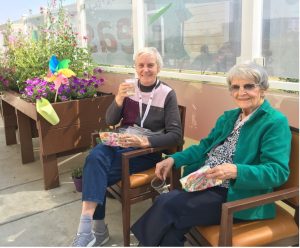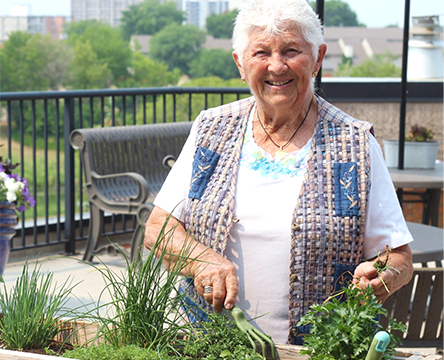
There’s a certain magic to being in a garden full of life and opportunity. Perhaps it’s the delicious elements that stimulate the senses: the smell of flowers and freshly turned soil, the vibrant colours, the feel of the sun and wind, hearing the bees buzzing, tasting what you’ve grown. Or perhaps it’s that gardening keeps you moving and outdoors.
The health benefits of gardening into your golden years have been well researched and the verdict is in. The world’s longest living people tend to share this hobby: gardening!
6 Benefits of Gardening for Older Adults
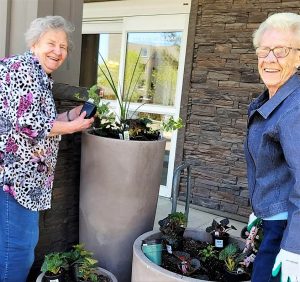 1. Gardening is a Heart Healthy Hobby
1. Gardening is a Heart Healthy Hobby
If you think about the movements and motions you go through in a typical gardening session, you will probably recall walking, reaching, bending, a sheen of sweat on your brow, and even your heart rate rising. Considered moderate cardiovascular exercise, a single hour of gardening can burn up to 300 calories! More importantly, exercise has some significant health benefits for older adults.
2. Gardening Boosts Confidence
Planting and growing a garden can provide a sense of purpose. Even if you weren’t born with a green thumb, after tilling, planting, nurturing, and harvesting plants, you will likely experience a sense of satisfaction and success, which builds confidence and boosts self-esteem.
3. It Promotes Relaxation
According to AgriLife Today, increased access to green space promotes well-being. People who can see plants or spend time in natural settings feel a sense of restoration. This makes gardening a form of mindfulness meditation, promoting stress-relief and relaxation. It’s so effective that gardening is often promoted as a potent form of therapy for seniors.
4. Grows Your Sense of Community
You don’t have to weed alone – nor should you. It’s well known that activities that promote a healthy lifestyle and encourage interaction with peers are recommended to prevent social isolation and loneliness in older adults. Connecting with others in gardening group is fun – and it contribute positively to the lives of others through the fruits, or vegetables, of your labour.
5. Gardens Contribute to Healthy Eating Habits
A productive plot can promote healthy choices by raising awareness and appreciation of fresh produce. It’s as farm-to-table as it gets! Gardening helps people develop a lasting habit of eating enough fruits and vegetables, something recommended by the Canada Food Guide.
6. Horticultural Therapy for Older Adults Experiencing Cognitive Decline
The creative and tactile experience of being near to nature is not only good for well-being but studies indicate that it may help relieve symptoms associated with Alzheimer’s disease and other dementias. Gardening can help people experiencing early cognitive decline retain many functional abilities. Using interactive garden features such as birdfeeders, raised garden beds, and bird baths maximizes the sensory and social aspects for those in mid-stage disease. With adequate paths and lighting, people who are living with late-stage dementia may enjoy simply being in the garden, walking or wheeling the paths with the help of a care partner.
Ways To Make Gardening Easier for Older Adults
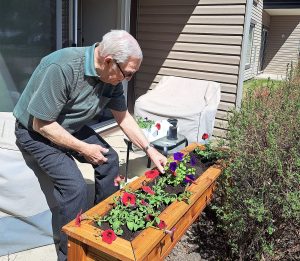 Some physical and cognitive changes may restrict or prevent people from participating in gardening. However, with planning and a few changes, you can create a safe, accessible, and pleasant outdoor area.
Some physical and cognitive changes may restrict or prevent people from participating in gardening. However, with planning and a few changes, you can create a safe, accessible, and pleasant outdoor area.
Suggestions include:
- Raise beds to help people with physical restrictions avoid bending and stooping.
- Use containers on castors to make movable and elevated garden beds.
- Look for adaptive tools and equipment like easy grip or reach tools – these are available from some hardware stores.
- Use lightweight tools that are easier to handle.
- Consider vertical planting to make garden beds more accessible – try using wall and trellis spaces.
- Make sure that stable chairs and tables are used for comfortable gardening.
- Be sure to provide shade areas for working in summer months or follow sun-safe practices.
Benefits of Memory Gardens
Auburn Heights Retirement Residence in Calgary provides a wonderful example of how gardens can benefit seniors living with dementia.
Alice, the Recreation Therapist working on the building’s Memory Care floor helps residents plant flowers, herbs, and vegetables in the Calgary senior memory care floor’s garden boxes.
“We’ve planted basil, peppermint, and rosemary in one of our garden boxes. When we sit outside on our patio, I often pick one or two herb leaves and have the residents smell them. Then, we discuss what we might use the herbs for”, Alice says. “They will tell me how those herbs remind them of the times they cooked at home for their children. The peppermint reminds them of peppermint candies. It’s really beautiful to experience.”
Some of our strongest memories, our most potent associations, are triggered by odor. A smell that you associate with an event or moment in the past will often transport you to that moment. And anything that has the power to channel reminiscences should be part of the daily life of any person with dementia.
Let Nature Nurture You at All Seniors Care
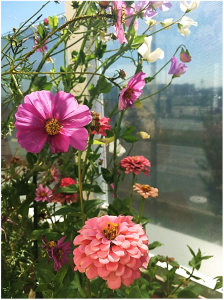 Find assisted living facilities for your loved ones (or yourself) that allow them to continue to pursue their favourite hobbies. Those who love gardening should explore our senior homes in Ottawa, London, and Stratford. Find out how we can facilitate active and independent senior lifestyles all while offering adaptable levels of care. It’s part of the way we ensure residents have the freedom to age in place.
Find assisted living facilities for your loved ones (or yourself) that allow them to continue to pursue their favourite hobbies. Those who love gardening should explore our senior homes in Ottawa, London, and Stratford. Find out how we can facilitate active and independent senior lifestyles all while offering adaptable levels of care. It’s part of the way we ensure residents have the freedom to age in place.
Those who love gardening should get in touch with us today and ask about gardening at our many seniors living centres across the country. Gardening activities lend themselves easily to people of all ages and abilities. This in turn builds teamwork, self-esteem, and self-confidence, and social interaction.
Writer – Julianna McLeod
Julianna is a health and wellness expert at All Seniors Care. Her mission is to create content that empowers seniors to form sustainable solutions for lasting health and happiness. She is an experienced writer, editor, and Recreational Therapist living in Toronto.
